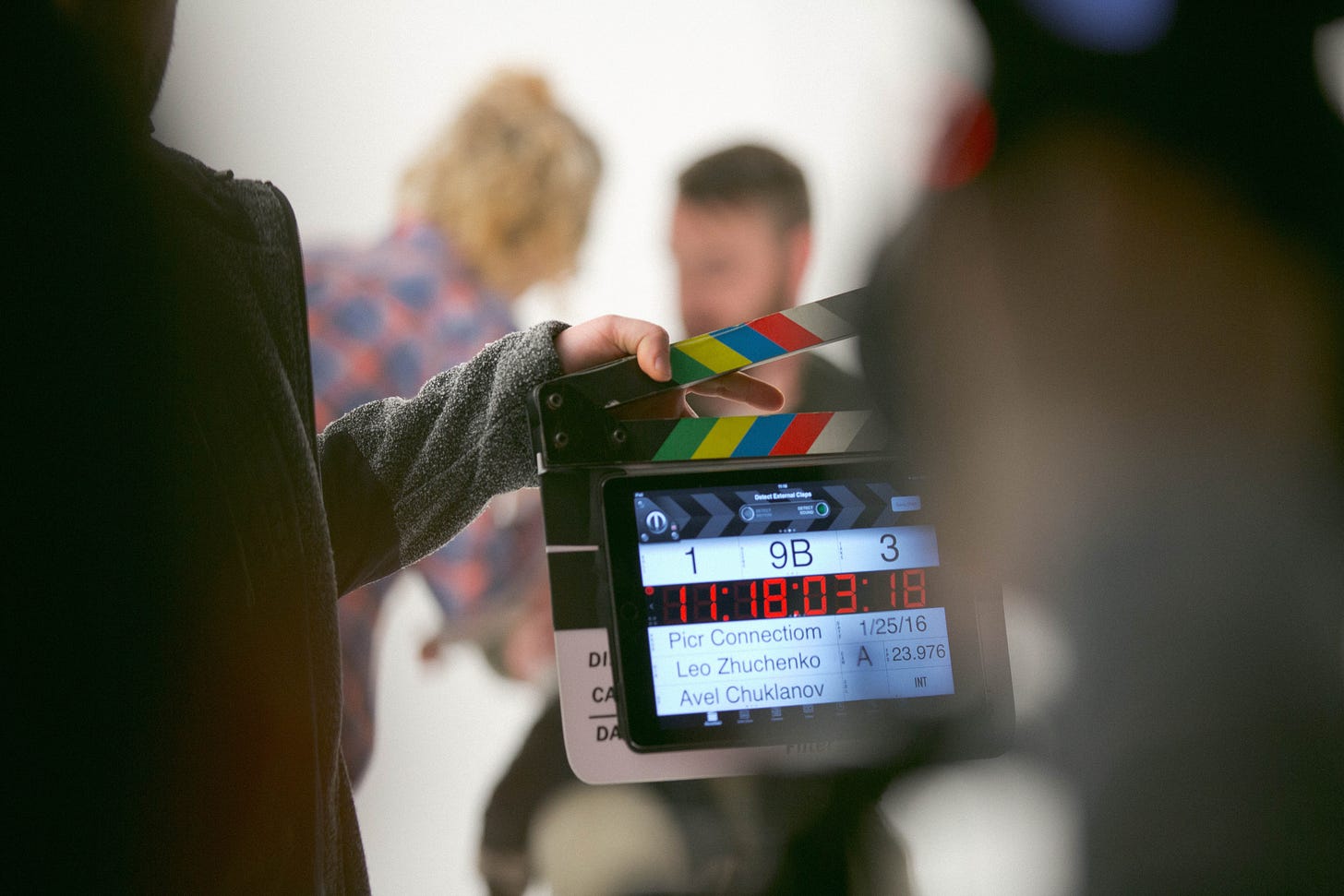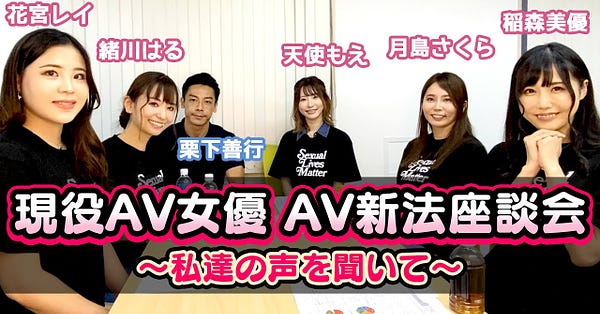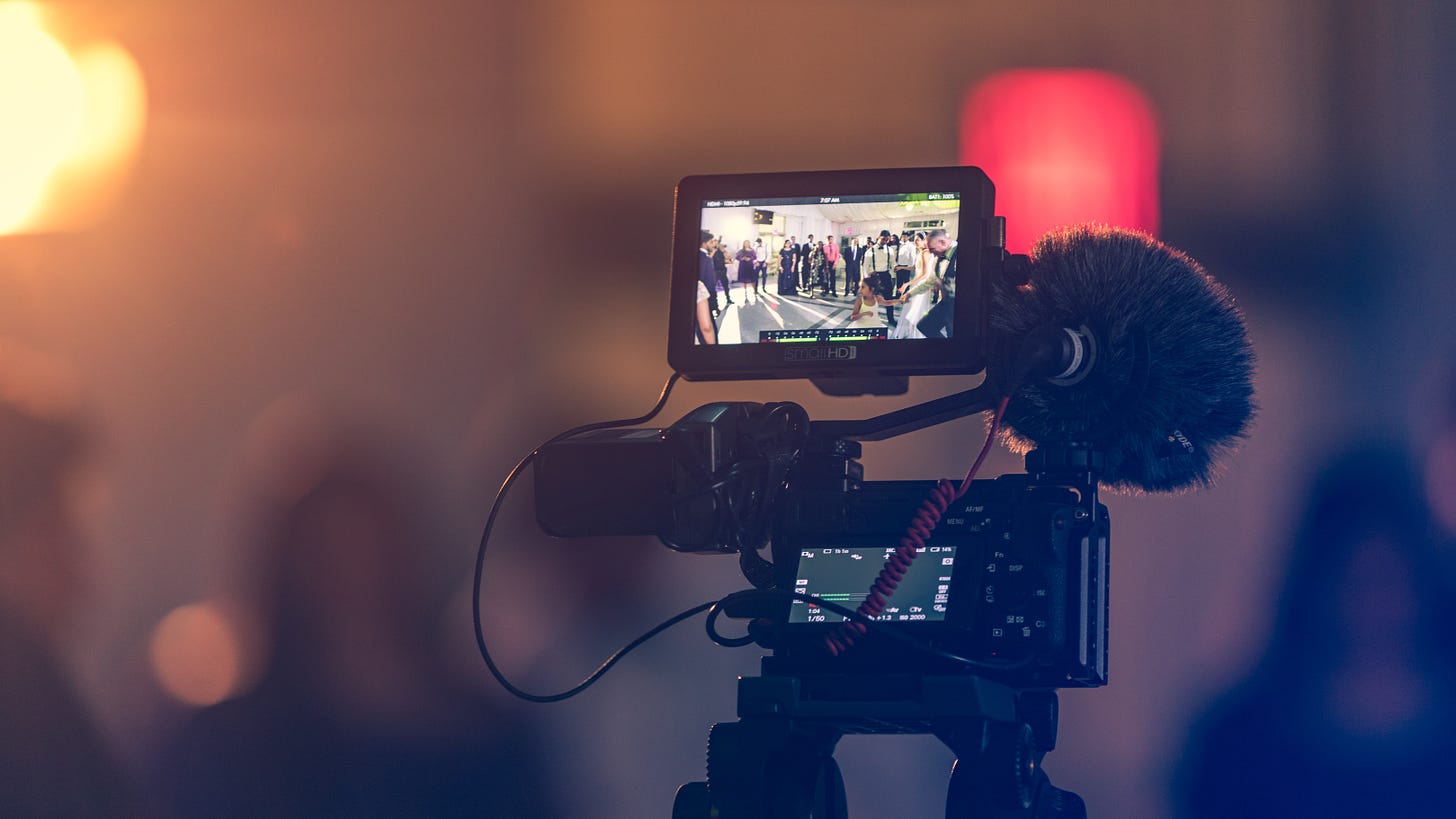Original link: https://sehseh.substack.com/p/avav
Japan’s “New AV Law” has sparked heated discussions from the beginning of its formulation to the day it hit the road. (Unsplash)
Text / Zhang Yujie
In April of this year, Japan revised the “Civil Law” from the age of 20 to 18 years old, and many legal norms that are bounded by the age of 20 have also been revised down to 18 years old, which has also affected the AV (adult film industry) industry. In order to protect the “grey area” between the ages of 18 and 20 caused by the revision of the age of majority in the Civil Code, Japan quickly enacted the ” AV Appearance Victimization Prevention and Relief Act “, commonly known as the “AV New Law” in just 3 months1 . However, in the process of amending the “AV New Law”, it did not discuss with relevant persons in the industry, or had a deep understanding of the current situation of the AV industry, and hurriedly revised the law, which caused the “AV New Law” from the beginning of its formulation to after it hit the road.
walk with us
” Walk the World” is committed to bringing you/you international news and viewpoints with different traditional perspectives,
Inviting you/you to become a member will actually help us present a different world scenery.
Lowering the age of adulthood will make high school students enter the AV industry?
The establishment of the “AV New Law” will start from March 23, the eve of the revision of the “Civil Law”, the age of majority. At that time, the AV victim support group PAPS (ぱっぷす) and the human rights organization Human Rights Now called on members of Congress to “suspend the lifting of the ban and allow high school students to participate in AV performances.”
They believe that long before the Civil Law was revised down, there were many cases of victims of minors under the age of 20 participating in AV performances. Under the value of “the younger the better” in the sex industry, once the adult age is revised down to 18 years old, there will be more high school students 3 from 18 to 20 years old to enter the AV industry. Therefore, I call on members of Congress to legislate to prohibit those under the age of 20 from being allowed to shoot AV, and the signing of AV-related contracts by teenagers under the age of 20 has no legal effect.
In fact, according to Japan’s “Children’s Purchasing Sex and Pornography Prohibition Law” (児児財春・ポルノ Prohibition Law ), the law only prohibits those under the age of 18 from being allowed to shoot AV, and does not stipulate that 18 to 20 years old cannot shoot AV. Therefore, the statement that “lowering the age of majority is equal to lifting the ban and allowing high school students to shoot AV” is not correct, and there is no law that prohibits high school students from shooting AV.
Minors’ right to cancel the last line of defense
However, before the “New AV Law” hit the road, in recent years, the Japanese AV industry has indeed seen fewer actors whose real age is between 18 and 20 years old. There are two reasons: (1) the rights of minors to cancel under the Civil Code, and (2) relying on the autonomous norms of AV operators.
In the past, when the age of majority in the Civil Law was still 20, if a minor under 20 did not have the consent of the guardian, even if he signed a contract with the AV film company, the guardian could cancel the contract content, which is called the “minor cancellation right” ( Minors take り し 権). This is also the crux of the revision of the Civil Code between the age of majority and AV. For teenagers under the age of 20 who used to make AV, the guardian can cancel the contract between the child and the AV film maker, and prevent the child from participating in the AV performance. Once the “Civil Law” is revised down to the age of 18, there will be no guardians for teenagers who are 18 to 20 years old in the future.
The AV industry in transition
At the same time, in view of the constant reports of AV actors accusing themselves of being tricked into making AVs in the past, Japan’s AV-related industries have been actively transforming in recent years, hoping to reverse these negative images. One of the major changes is the establishment of the “AV Human Rights Ethics Agency” in 2017. As a third-party ethics committee in the AV industry, it is responsible for supervising the major AV film companies, AV actress firms and other related industries, and whether they have actually abide by the ethical standards. One of them is to require major filmmakers not to allow people under the age of 20 to participate in AV performances.
Therefore, the “AV Human Rights Ethics Agency” issued a document on the same day (2022/3/23) on the same day that the aforementioned civic group requested members to “suspend the lifting of the ban and allow high school students to participate in AV performances”, emphasizing that in recent years, relying on the independent regulations of the AV industry, and We did not allow teenagers under 20 years old to participate in AV performances, and called on major industry players to follow the usual practice in the future, not to let people under 20 years old make AV.
Japan’s AV-related industries have been actively transforming in recent years, hoping to reverse the negative image. (Unsplash)
It takes only 3 months from initiative to legislation
However, the AV Human Rights Ethics Organization only needs to get franchisees, and it is difficult to guarantee that small film producers who have not joined the AV Human Rights Ethics Organization, or “net porn” who publish and sell pornographic content on the Internet by themselves will abide by industry norms. These institutional loopholes are unbearable for civic groups that firmly oppose AV and believe that as long as AV exists, there will be victims.
Driven by these civic groups, the ruling and opposition parties 4 quickly reached a consensus and expanded the awareness of the issue from “protecting 18 to 20-year-olds” to “preventing anyone from being forced to participate in AV performances”, and regarded this as a serious violation human rights issues. The ruling and opposition parties completed the draft in just one month, and then the “New AV Law” was officially launched, and it took only three months in the middle.
A cooling-off period is required before and after filming
Due to the “New AV Law” in the legislative process, the awareness of the problem has been changed to “to prevent anyone from being victimized by being forced to participate in AV”. Therefore, the new law sets a “cooling-off period” of at least 5 months before and after, causing dissatisfaction among the industry.
The key highlights of the “AV New Law” are as follows:
-
Performers must not be forced or required to have sex during the filming process.
-
When an AV film maker signs a contract, it must record the sexual behavior during the shooting process in detail in a written contract, and is obliged to explain to the performers that shooting AV is likely to expose the true identity of the individual. If the business operator makes a false statement when signing the contract, or coerces the party not to terminate the contract, it can be punished with imprisonment for not more than three years or a fine of not more than 3 million yen; if it is a legal person, a fine of not more than 100 million yen can be imposed.
-
After signing a written contract, a cooling-off period of more than one month must pass before AV filming can take place.
-
After the AV filming is over, you must wait for a cooling-off period of more than 4 months before you can publish your work.
-
Within 1 year of the AV video being released to the public (2 years when the new law was launched), performers can unconditionally terminate the contract without paying liquidated damages.
In general, the content of the bill seems to protect performers at first glance. It not only guarantees that AV performers can unconditionally terminate their contracts, but also leaves a “cooling-off period” before and after the filming, in case that newcomers who enter the AV industry by mistake will “be out of touch for a while.” Think clearly and regret it later.”
AV players worry about the collapse of the industry
However, many people in the AV industry have criticized that the “New AV Law” simply does not understand the operation mode of the industry: it takes 5 months before and after the “cooling-off period” to make a film, plus the shooting and post-production time, to make a film The operation time of the AV industry will be extended to more than half a year, which will seriously affect the capital turnover of the AV industry. Once the work flow of making a film gets longer, the actors will have to wait longer to receive their salaries. The entire AV industry is likely to face disintegration or suffer huge losses during the painful period at the beginning of the new law.
Therefore, there is currently a school of opinion that since the “New AV Law” is to protect “newcomers who have entered the AV industry by mistake”, the cooling-off period should be reserved for newcomers. For actors who are no longer newcomers and clearly understand the AV industry and risks, there should be no cooling-off period. “Protection” is.
#AVNew Law #Symposium #AV Actress Unemployment Law #正正をAV Shou る#AV New Law をかえたい
#Angelもえ@amatsuka_moe
#月shimaさくら@sakuratsukisima
#inamorimiyu @inamorimiyuu
#ogawaはる@ogawa_haru_
#花宫レイ@hanamiya_lei2
Women’s movement groups and victims’ groups are also dissatisfied with the new law
In addition, the women’s movement groups and AV victim support groups that called on Congress to enact legislation to protect “teens aged 18 to 20” were also dissatisfied with the content of the “New AV Law” that was finally passed. For the faction that opposes the AV and sex industry and believes that the AV industry is to please the male society and exploit women, as long as the AV industry exists one day, there will be women who will be tricked into making AV. It is best to block the entire AV industry. The “New AV Law” not only fails to do this, the government has enacted a special law for AV, representing the government’s recognition of AV filming as a legal contractual relationship. This is really unacceptable to women’s movement groups who have long opposed AV.
AV victim support groups also have something to say. The “AV Appearance Countermeasures Committee” composed of AV victims advocated that the “AV New Law” should prohibit filmmakers from actively seeking out newcomers, in order to effectively prevent newcomers from being tricked into making AVs. They also called for the establishment of an intimacy coordinator on the AV studio to protect the rights of AV performers.
Another aspect of the discussion about the “New AV Law” is that the “New AV Law” originally revised the age of majority from the “Civil Law”, so it was necessary to “protect” young people aged 18 to 20. However, the “Civil Law” will lower the age of majority, that is, people over the age of 18 are considered to have full capacity for conduct, and they can understand and judge whether to sign a civil contract. From the perspective of “protecting young people”, prohibiting 18 to 20-year-olds from signing contracts with AV companies would actually be contrary to the original decision to revise the age of majority in the Civil Code.
The income of many AV male and female actresses has dropped significantly
After the “New AV Law” hit the road, the most obvious change in the AV industry is that the income of many AV actors and actresses has decreased instantly. The “New AV Law” stipulates that you have to wait more than one month before shooting, so after the new law hits the road, you can’t shoot for at least the first month. The entire capital turnover time is prolonged, and male and female actresses will receive their salaries later, and some filmmakers even choose to wait and see the industry situation before deciding whether to start work.
An association formed by AV actress firms ( Japanese プロダクション Association ) pointed out that 37% of active actresses had their income cut in half after the new law hit the road, and 7.8% said their income was zero. In terms of AV male actors, some people’s incomes have decreased, and some people’s incomes have increased. The reason is also related to the cooling-off period. The “New AV Law” stipulates that a one-month cooling-off period is required before filming. If the originally finalized male actor suddenly has something to do that day and cannot be filmed, he cannot immediately find someone to replace him. Therefore, some filmmakers simply spend a lot of money, knocking on a few more male actors at the beginning. A small amount of AV male actors in the middle and upper levels make a small profit.
In addition, the “New AV Law” tightens the relevant regulations for AV shooting, and may also make some AV actors simply switch to online pornography in disguise. After all, there are so many channels for online pornography. If it is just to make quick money, everyone may be able to earn more according to their abilities.
New AV law won’t address digital sexual violence
Although it remains to be seen whether the “New AV Law” can achieve the expected goals after it hits the road, it is certain that the law enforcement agencies have the intention to deal with the problem of “being tricked into filming AV” or digital sexual violence, and have established an agreement with the government. The “New AV Law” is completely two different things.
In recent years, the AV industry has achieved certain results by relying on the industry’s self-regulation, but the AV human rights ethics organization only needs to be recognized and join the big manufacturers of the AV human rights ethics organization, the vile AV industry or the underground AV, erotic photography, AV traded in the black market Human rights and ethics institutions are not in control, and law enforcement agencies are not active enough. The newly established “AV New Law” is only applicable to the AV industry, and law enforcement agencies still cannot control Internet pornography or erotic photography.
Whether the law enforcement unit really wants to deal with the problem of “forced to take private images” and “private images outflow” is the real key to solving the problem of victimization. (Finish)
It remains to be seen whether the “AV New Law” can achieve the expected goals after it hits the road. (Unsplash)
About the author| Zhang Yujie (currently working as an international news editor, runs the Japanese current affairs news platform “Ishikawa カオリ Japanese Current Affairs まとめ Translation”, full-time Japanese news compilation, analysis and commentary, and occasionally writes popular science articles.)
The world walks around with important stories you/you haven’t read yet. We focus on global issues from a gender perspective, complementing stories of dilemma, breakthrough, connection, and change that traditional power perspectives ignore.
Subscribe to support ”Walk the World” , thank you for moving forward with you.
See more member exclusive benefits ?
It was exactly three months from the initiative of the citizen group on March 23 to the implementation of the “New AV Law” on June 22.
The full name should be “Sex を め ぐ る Personal の 厳 が Heavy ん ぜ ら れ る Society の Formation に Investing す る た め に Sexual Behavior Video Production へ の Appearance に Department る Victim の Prevention を 図 り and び Actor’s Rescue に に る た の Special Appearance Contract ゙Then wait に close す る law”, or “Law No. 78 of the 4th year of Reiwa”.
The education system in Japan is the same as in Taiwan, with 6 years of elementary school, 3 years of middle school, and 3 years of high school. Therefore, under normal circumstances, Japanese high school students should be between 18 and 19 years old when they graduate.
The ruling Liberal Democratic Party-Komeito coalition and the opposition Cadets
Take the privately recruited cool photo shooting site as an example: although the shooting of cool photo photos does not involve sexual acts in name, the relatively closed nature of the shooting site can easily put the subjects at risk. In case the person being photographed went to the studio and found that the scene was different from what was originally promised (thought he was going to debut as an idol, but was tricked into taking cool photoshoots), he might be pressured to resist when he arrived at the studio (forced to take pictures). Under the cool photo), and may even be sexually assaulted. There is no legal protection for cool photo photos. If an image that is unwilling to be released to the public is taken, and it is maliciously distributed afterwards, it will evolve into an outflow of private images. If the AV is leaked, it can now be handed over to the AV human rights and ethics agency in Japan, but if it is the case of underground AV, online pornography, or cool photo shoots, there will be much fewer relief channels, and even there is no way to ask for help.
This article is reprinted from: https://sehseh.substack.com/p/avav
This site is for inclusion only, and the copyright belongs to the original author.




